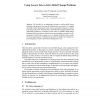121
Voted
LPNMR
2007
Springer
15 years 8 months ago
2007
Springer
Abstract. We present a framework for updating logic programs under the answer-set semantics that builds on existing work on preferences in logic programming. The approach is simple...
129
Voted
LPNMR
2007
Springer
15 years 8 months ago
2007
Springer
We describe BE, an implemented system for solving belief change problems in the presence of actions. We illustrate how we can use BE to compute the result of belief progression, be...
105
Voted
LPNMR
2009
Springer
15 years 8 months ago
2009
Springer
We consider random logic programs with two-literal rules and study their properties. In particular, we obtain results on the probability that random “sparse” and “dense” pr...
118
Voted
LPNMR
2009
Springer
15 years 8 months ago
2009
Springer
We define the semantics of logic programs with (abstract) constraint atoms in a way closely tied to default logic. Like default logic, formulas in rules are evaluated using the cl...

